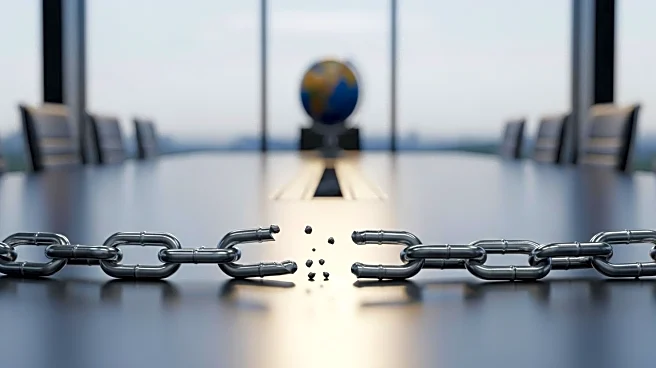What's Happening?
Luis Vayas Valdivieso, the chair of the United Nations plastics treaty talks, has announced his resignation due to personal and professional reasons. This decision comes after reports of pressure from the United Nations Environment Programme (UNEP) and criticism from various stakeholders. The treaty negotiations, aimed at addressing global plastic pollution, have been stalled since August when talks in Geneva collapsed after three years of discussions. Vayas Valdivieso faced criticism for releasing a draft text that was rejected by negotiators, including the UK and Ghana, for not being ambitious enough. The resignation leaves the treaty process in uncertainty, raising questions about its governance and future direction.
Why It's Important?
The resignation of the chair of the UN plastics treaty talks is significant as it highlights the challenges in reaching a global consensus on reducing plastic pollution. The stalled negotiations impact efforts to limit plastic production and address hazardous chemicals in plastics, which are crucial for environmental sustainability. The involvement of petrostates and plastic industry lobbyists in derailing the treaty underscores the influence of powerful economic interests in environmental policy-making. The resignation may lead to a reevaluation of the negotiation process, potentially affecting international cooperation on environmental issues.
What's Next?
The resignation opens the possibility for new leadership and initiatives in the treaty process. Stakeholders, including member states and NGOs, may push for increased transparency and a more ambitious approach to negotiations. UNEP's role and actions during the talks may be scrutinized, potentially leading to changes in how future negotiations are conducted. The search for a new chair and the direction of the treaty talks will be closely watched by environmental groups and governments, as they seek to restore trust and achieve meaningful outcomes in combating plastic pollution.
Beyond the Headlines
The resignation of Luis Vayas Valdivieso may have deeper implications for international environmental governance. It highlights the ethical and procedural challenges in global treaty negotiations, where transparency and impartiality are critical. The situation may prompt discussions on the role of UNEP and other international bodies in facilitating fair and effective negotiations. Long-term, this event could influence how environmental treaties are structured and negotiated, potentially leading to reforms that prioritize environmental integrity over economic interests.










